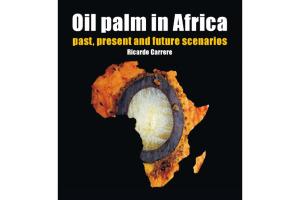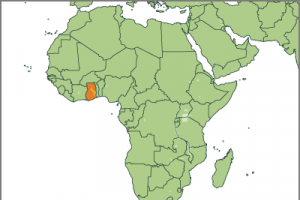Governments are opening the doors to corporations for planting vast areas of land with oil palm plantations. This trend is not only happening in West and Central African countries, but is even expanding to parts of Eastern Africa. Large scale oil palm plantations are already causing serious environmental and social impacts in some countries, resulting in loss of community rights over their territories.
Ghana
Publications
30 August 2013
Bulletin articles
5 June 2011
The natural and environmental resources of Africa like land, minerals, gas, oil, timber, territorial waters among others have been the object of the persistent scramble for the continent. Natural resources are often at the heart of the scramble for Africa.
Other information
26 October 2008
The US-based Newmont Mining Corporation, one of the world's largest producers of gold, has plans to place an open pit gold mine in the Ajenjua Bepo Forest Reserve in the Birim North District in the Eastern region of Ghana.
The organization No Dirty Gold informs that the projected mine would occupy an area 1.65 miles long (2.6 km) and a half mile across (0.8 km), and would create waste piles 60-100 m high. The mine would destroy an estimated 183 acres (74 ha) of forest in the reserve.
Other information
30 August 2008
By Bakari Nyari, Vice Chairman of Regional Advisory and Information Network Systems (RAINS), Ghana and African Biodiversity Network Steering Committee member
This is the story of how a Norwegian biofuel company took advantage of Africa’s traditional system of communal land ownership and current climate and economic pressure to claim and deforest large tracts of land in Kusawgu, Northern Ghana with the intention of creating “the largest jatropha plantation in the world”.
Bulletin articles
28 August 2008
Members of FoE Africa from Ghana, Togo, Sierra Leone, South Africa, Nigeria, Mauritius, Tunisia and Swaziland met for five days in Accra, Ghana reviewing issues that confront the African environment. A particular focus was placed on the current food crisis and agrofuels on the continent.
Other information
28 April 2008
Ghana: Norwegian biofuel company destroyed local forest to establish a large jatropha (1) plantation
Agriculture in Northern Ghana accounts for more than 90% of household incomes and employs more that 70% of the population in the region. Most of the agricultural production is by small-holders at subsistence level, reliant on seasonal rainfall which is unpredictable and sporadic. During the dry season much of the population is idle, forcing people to migrate to the more prosperous southern parts of the country where they are employed in menial jobs.
Bulletin articles
8 January 2006
The government of Ghana and Sino Hydro, a Chinese construction company, have signed a memorandum of understanding and a 500 million-dollar agreement to undertake the construction of the Bui Dam. Two million dollars are earmarked for the Environmental Impact Assessment (EIA) bound to prepare the ground for the take-off of the project, which has been on the drawing board for decades.
Bulletin articles
20 May 2005
On last April 27, an international team of representatives including from the Ghanian Wassa Association of Communities Affected by Mining (WACAM) called on Newmont Mining, the world's largest gold producer, to urgently reform its human rights and environmental practices at its global operations and to permanently cancel plans for new, open-pit mines on densely populated farmland in Ghanaian forest reserves, in Romania, and on a mountain in Peru that is a source of community drinking water.
Other information
28 August 2004
Even by conservative estimates, less than a quarter of Ghana’s pre-colonial forest remains. Loggers and politicians caused most deforestation, though they like to shift the blame to farmers. But the fact is that throughout the Twentieth Century farmers have had little control over the trees on their land. British colonialists gave timber rights to chiefs, who promptly sold them to loggers, or ordered them cleared and replaced with cacao plantations. After independence, the government claimed ownership of all trees and land, and sold most of it off to loggers.
Bulletin articles
11 March 2004
Decades of deforestation and forest degradation have left less than two percent of Ghana's native forest intact. These forests have been the source of livelihood for forest dependent people, providing them with fuel wood, charcoal, building materials, fodder, fruits, nuts, honey, medicines, dyes. They also play an environmental role regarding prevention of soil erosion, watershed protection, soil fertility/shade, shelter from wind, prevention of floods and landslides, water retention and maintenance of water purity.
Bulletin articles
12 February 2004
The Center for International Forestry Research has implemented a program called Adaptive Collaborative Management of Forests (ACM) for more than five years. At its most extensive, we worked in 11 countries (Nepal, Indonesia, Philippines, Kyrgyzstan, Malawi, Cameroon, Zimbabwe, Ghana, Madagascar, Bolivia and Brazil); and activities continue in eight. One of the striking elements of this work has been our success at involving women (and other marginalized groups) in our work with communities.



